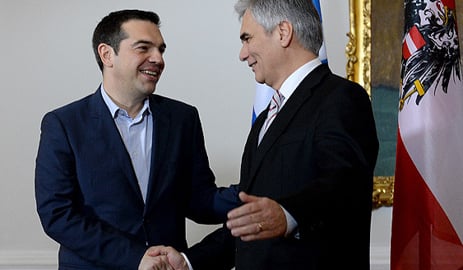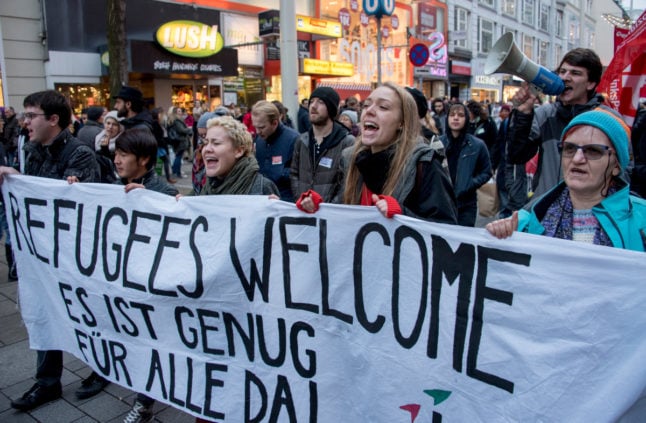His plane was delayed by an hour due to snowy and stormy conditions, but he was welcomed outside the Chancellery building by a crowd of around 100 well-wishers, including representatives from Austria's Communist Party and Socialist Youth.
The meeting between the two leaders was reported to be cordial, with Tspiras saying that had "found a good friend" in Faymann, and adding that he hoped to cooperate closely with Austria in the future.
Tsipras said that he was "optimistic" about reaching a compromise with the European Union on renegotiating Greece's massive international bailout.
"There is a common desire to resolve this crisis. I am optimistic that we will reach a compromise with our European partners," he told a press conference in Vienna.
He and Faymann discussed Austria's economic and social model, as well as ways of working to combat tax fraud.
Tsipras' visit to Vienna comes two days before a meeting of eurozone finance ministers and a European summit focused on the Greek crisis on Thursday.
Before the meeting Faymann indicated that Austria would take a softer line with Greece than Germany has, with Berlin and Athens locking horns over debt relief. "I see a possibility for a European consensus," Faymann said last week.
Greece's new leftist government has said the country intends to honour its debts but Tsipras has insisted he would be "unshakeable" in carrying out an anti-austerity agenda and called for temporary EU funding to help stave off a default.
Greece also claims that Germany never compensated it for all the damage wrought by the Nazis during World War II.
EU officials have rejected Tsipras' efforts to renegotiate Greece's bailout terms. On Monday German Finance Minister Wolfgang Schäuble said that "if they (the Greeks) want our help, there needs to be a programme" agreed with creditors, rather than the emergency assistance that Athens had called for.
'Against Austrian interests'
In an interview with the Kurier newspaper on Sunday Faymann was unusually critical of German Chancellor Angela Merkel, saying that her “plan of wait and see had failed” and that measures to prop up the banking system after the financial crisis had been “a little late”.
He was sympathetic towards Tsipras, saying that “he wants to fight corruption and tax fraud – which is more logical than making cuts and privatising the crisis”. He said that he supported negotiations “on credit conditions, so that Greece has scope to come out of the crisis”.
The conservative People’s Party (ÖVP) was critical of Tsipras' visit, with General Secretary Gernot Blümel saying that Faymann's "search for international recognition" presents a "risk for local taxpayers". He added that criticizing Merkel and "kneeling" before Tsipras was "against Austrian interests".



 Please whitelist us to continue reading.
Please whitelist us to continue reading.
Member comments